Embrace the vibrant world of Vietnamese cuisine as a foreign tourist, where the rich and delicious flavors of traditional dishes are accessible to vegans. Whether you’re exploring local restaurants or street food vendors, you’ll find an array of delightful plant-based options that capture the essence of Vietnamese culinary artistry. In this guide, we’ll introduce you to our favorite vegan discoveries and equip you with essential keywords for requesting vegan meals in Vietnamese. Get ready to embark on a cultural and culinary adventure that celebrates innovation, tradition, and the joy of exceptional vegan dining. Bon appétit!
Contents
Vegan in Vietnamese
Vietnam embraces vegetarianism as an integral part of its culture, religion, and culinary heritage. For centuries, the vegetarian diet has played a significant role in Vietnamese cuisine for spiritual and health reasons and as a growing movement in society.
Vietnamese Vegetables
Vietnam’s tropical climate provides a fertile ground for a remarkable array of vegetables and fruits, contributing to the surge in popularity of vegan and vegetarian options in the country. It’s no wonder that the nation’s cuisine is celebrated for its vibrantly colored and refreshing ingredients, and the rise of veganism is harmoniously woven into this culinary landscape.
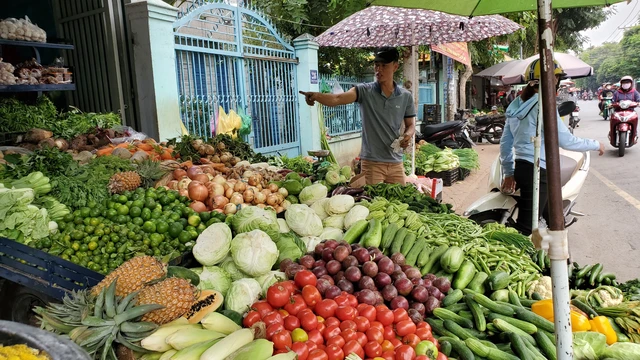
Exploring Restaurants
Vietnam’s culinary landscape has witnessed a remarkable transformation, with vegan restaurants blooming across the country. As the popularity of plant-based cuisine continues to soar, restaurants in Vietnam have embraced this trend by offering an array of vegan options and dedicated menus. Whether you find yourself in vibrant cities like Ho Chi Minh or Hanoi, you’ll be pleasantly surprised by the diverse and mouthwatering vegan dining scene.
Vietnam’s vegan restaurants have mastered the art of crafting delicious dishes that cater to all taste preferences. From traditional Vietnamese delicacies to innovative fusion creations, there’s something to satisfy every craving. You’ll discover an abundance of eateries that take pride in sourcing high-quality ingredients while maintaining affordability, making it an exciting time for both vegans and non-vegans to explore the world of plant-based cuisine in Vietnam.
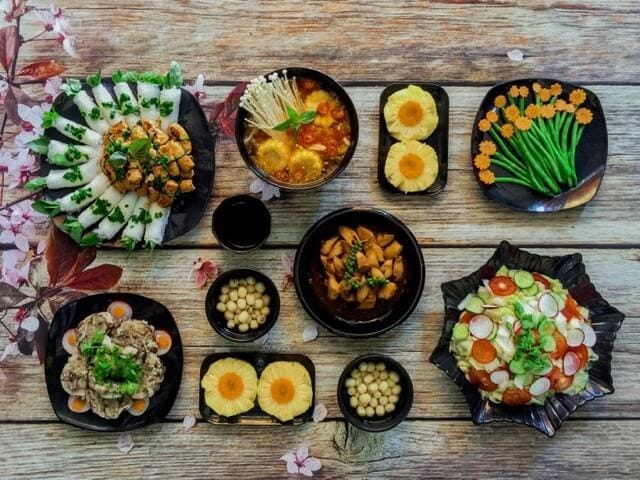
For vegan travelers, Vietnam is a dream come true, as you won’t have to compromise on your dietary preferences during your visit. Whether you’re strolling through bustling streets or dining in upscale establishments, you’ll find a wide range of vegan-friendly options to tantalize your taste buds. Whether you’re in Hanoi, Ho Chi Minh City, or any other province, the best vegan restaurants in Vietnam offer exceptional dishes and unique dining experiences that showcase the country’s culinary diversity.
Embark on a journey of culinary exploration and immerse yourself in Vietnam’s vibrant vegan food scene. Get ready to indulge in flavorful and innovative plant-based dishes that will leave you wanting more. Whether you’re a committed vegan or simply curious about the world of vegan cuisine, Vietnam welcomes you with open arms and a tempting array of dining options to delight your senses.
Cultural Values of Vietnam Vegan Food
Vietnam boasts an incredible variety of traditional and modern vegetarian dishes that showcase the country’s culinary prowess. Drawing inspiration from beans, mock meat, vegetables, and aromatic spices, these dishes offer a unique and enticing flavor profile. Among Vietnam’s most beloved traditional vegan dishes are vegetarian pho, banh mi chay (vegan sandwich), vegetarian spring rolls, sticky rice with vegetarian filling, vegetarian vermicelli, vegetarian burnt rice, and other distinctive creations.
Exploring Vietnamese dishes will make your trip more anjoyable.
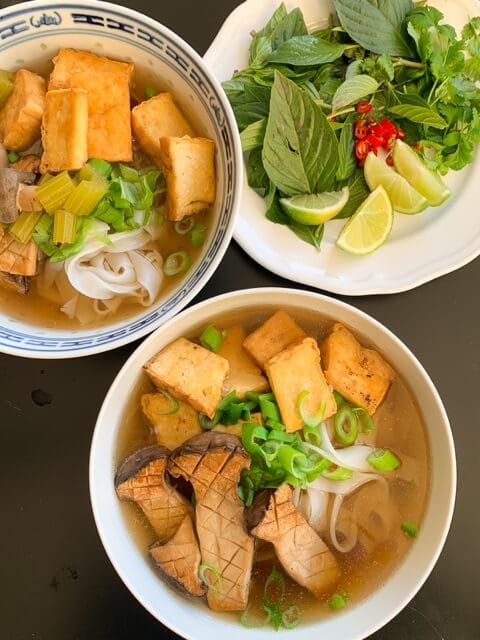
Its deep connection to culture, religion, and ethics sets Vietnamese vegetarian cuisine apart. Guided by principles rooted in Buddhism, vegetarianism in Vietnam extends beyond abstaining from meat. It encompasses avoiding alcohol, drugs, constipating foods, and strongly flavored ingredients. These principles promote the health and well-being of vegetarians and reflect the core tenets of Buddhist belief.
To embark on a culinary journey through Vietnam’s vegetarian cuisine, seek out traditional vegetarian restaurants in major cities like Hanoi and Ho Chi Minh City and across various provinces throughout the country.
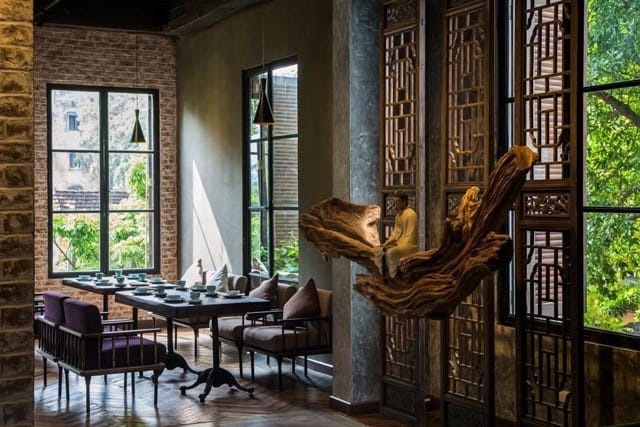
You can also immerse yourself in the flavors of Vietnam by joining vegetarian food tours, where you can discover the diverse and abundant world of traditional vegan dishes Vietnam offers.
With its rich cultural heritage and abundant plant-based ingredients, Vietnamese cuisine has a treasure trove of traditional vegan dishes waiting to be explored.
These dishes offer nutritional value and reflect the cultural significance of veganism in Vietnam. From the famous vegetarian pho to the tantalizing banh mi chay, these culinary delights showcase the flavors and techniques that have been passed down through generations.
If you want to savor the essence of Vietnamese culture and indulge in the vibrant world of vegan cuisine, Vietnam’s traditional vegan dishes will captivate your taste buds and leave a lasting impression.
In particular, southern Vietnam boasts a rich tapestry of vegan cuisine. Exploring the vibrant streets of Ho Chi Minh City or the lush Mekong Delta, you’ll encounter a plethora of vegan delights that highlight the region’s unique flavors and local produce.
Don’t miss the opportunity to delve into Vietnamese vegan cuisine’s rich heritage and flavors. By embracing plant-based dishes in Vietnam, you’ll satisfy your taste buds and connect with the country’s culinary traditions and cultural roots.
From bustling street vendors to cozy restaurants, the diverse vegan options in Vietnam are a testament to the country’s commitment to providing exceptional and flavorsome plant-based dining experiences.
Traditional Vegan Vietnamese Food
Vietnam boasts an incredible variety of traditional and modern vegetarian dishes that showcase the country’s culinary prowess. Drawing inspiration from beans, mock meat, vegetables, and aromatic spices, these dishes offer a unique and enticing flavor profile.
Pho Chay (Vegan Pho)
Vietnam’s renowned dish, Pho, has a vegan version known as Pho Chay. This delectable bowl of noodle soup traditionally features a flavorful broth, rice noodles, and tender slices of meat. However, Pho Chay takes the essence of this classic and transforms it into a sumptuous vegan treat. In place of meat, you’ll find a delightful array of tofu, mushrooms, and a medley of fresh herbs. The aromatic broth is a symphony of spices and herbs, offering a rich and satisfying experience for vegans. It’s not just a dish; it’s a cultural and culinary exploration that will leave your taste buds tingling with delight.
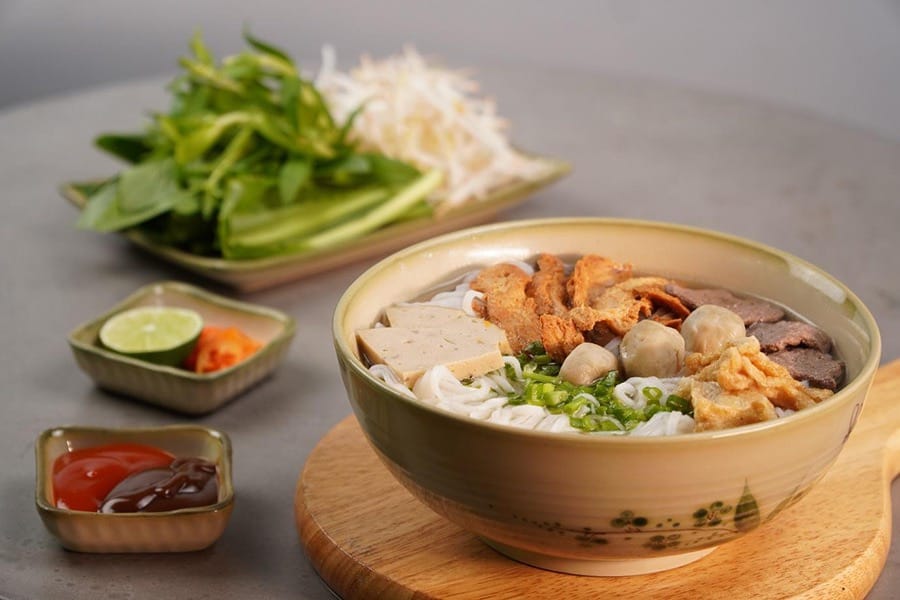
Bánh Mì Chay (Vegan Banh mi)
Banh Mi, a beloved Vietnamese sandwich, typically features a variety of meats and pâté. But vegans need not miss out on this culinary delight. Bánh Mì Chay is a vegan-friendly version of this iconic street food. It’s a fusion of flavors and textures, with crispy baguette, savory plant-based fillings like tofu or seitan, and an assortment of fresh vegetables and herbs. The result is a deliciously satisfying sandwich that perfectly combines the crunch of the bread with the lusciousness of the fillings. Savor the art of simplicity and deliciousness in every bite.
Chè
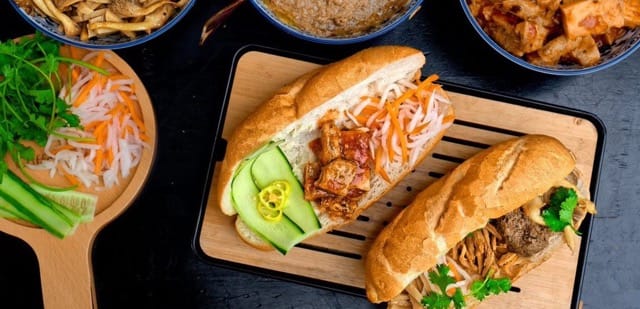
Chè (Sweets)
Vietnamese cuisine is renowned for its vibrant flavors, and it doesn’t stop at savory dishes. It extends into the world of Chè, a diverse array of Vietnamese desserts that offer a harmonious blend of flavors and cultural traditions. Most of Chè in Vietnam is vegan dishes. As a traveler, exploring Chè is a captivating journey into the heart of Vietnam’s culinary artistry, where you’ll discover a delightful world of sweet treats waiting to be savored.
There are many kinds of che in Vietnam: chè đậu đỏ (red beans sweet), chè khúc bach (Khuc Bach Sweet),…
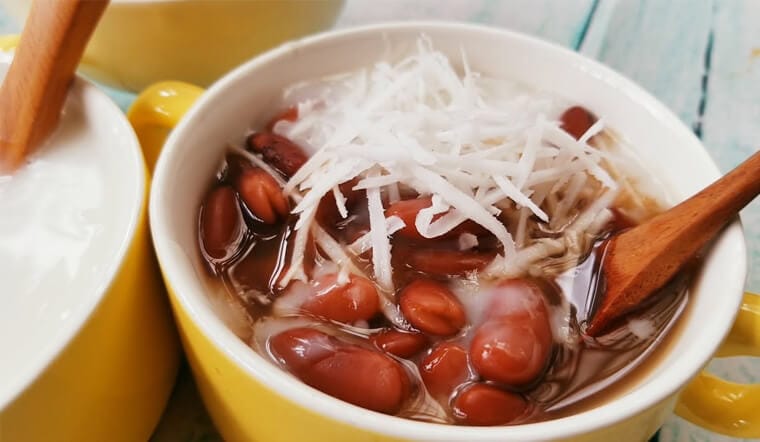
Bánh Cam (Orange Cake or Vietnamese Sesame Balls)
Concluding your Vietnamese culinary adventure, don’t forget to indulge in the sweet, vegan delight of Bánh Cam. These golden-fried Vietnamese sesame balls, also known as orange cakes, are a popular street food snack. Traditionally filled with sweet mung bean or paste. Each bite is a blend of crispy, slightly sweet exteriors and a luscious, aromatic filling. A bite-sized dessert that serves as a perfect ending to your plant-based culinary exploration in Vietnam.
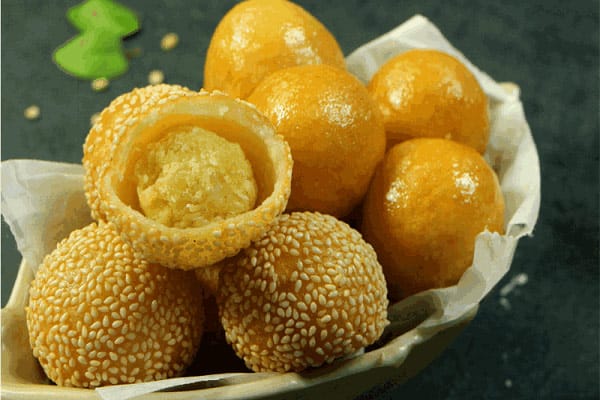
How to Request Vegetarian Food in Vietnam?
Embarking on a vegetarian journey while traveling in Vietnam may seem challenging, but with a little preparation and understanding, it can become an exciting culinary adventure.
The country is renowned for its meat-centric cuisine, so finding vegetarian options requires some knowledge and tact. Equipping yourself with a few useful phrases and respecting local customs can ensure a positive and enjoyable experience while savoring the flavors of Vietnam’s vegetarian cuisine.
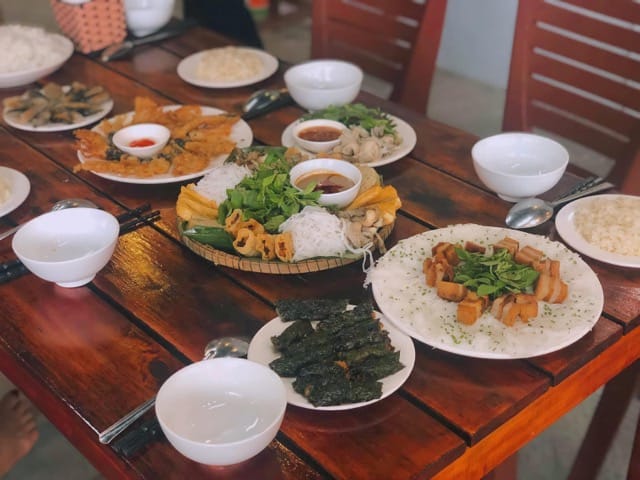
Communicating your dietary preferences effectively is key when dining out, especially in a foreign country. In Vietnam, most restaurants offer delicious vegetarian options, and knowing how to convey your needs to the waitstaff can make all the difference.
Start by familiarizing yourself with the phrase “Tôi ăn chay,” which means “I am vegetarian.” This simple phrase will help convey your dietary choice to the staff.
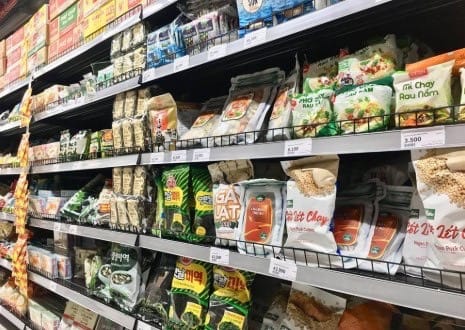
To further specify your preferences, you can add details about ingredients you do not want in your dish.
For example, you can say, “Tôi ăn chay và không ăn thịt,” which means, “I am vegetarian, and I do not eat meat.” Clear and direct communication is essential, and don’t hesitate to seek clarification or ask questions if needed.
Understanding the cultural norms and etiquette surrounding dietary requests in Vietnam is also important. Remember to be respectful and patient when making your requests.
Vietnamese cuisine has a rich heritage, and chefs take pride in their creations. By approaching conversations with an open mind and showing appreciation for the local culinary traditions, you are more likely to receive a warm and accommodating response.
You can enjoy a delightful vegetarian meal in Vietnam with a little effort. From street food stalls to upscale restaurants, a wide range of vegetarian options is waiting to be discovered. Embrace the opportunity to explore new flavors and dishes, and be open to trying traditional Vietnamese vegetarian cuisine.
By fostering a friendly and understanding atmosphere, both you and the local establishments can create a memorable dining experience that respects your dietary preferences.
If you visit Vietnam in mid-autumn festival, try Mooncake to have a non-touristy experience.
Vegan Food Options in Non-Vegan Restaurants
The rise of veganism is making waves worldwide, and Vietnam is embracing this dietary shift with open arms.
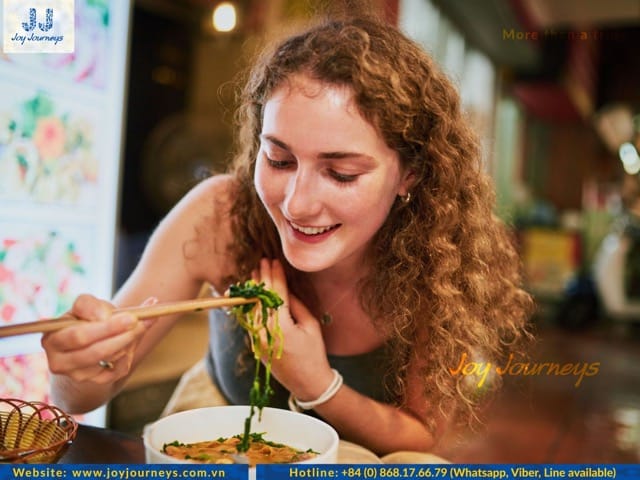
While traditional Vietnamese cuisine may only sometimes align with a plant-based lifestyle, the country’s food culture is evolving to accommodate the growing demand for vegan options.
Non-vegan restaurants in Vietnam are becoming more flexible and adaptable, offering an array of vegan dishes that cater to various dietary restrictions.
It’s inspiring to witness how Vietnam, known for its meat-centric dishes, embraces veganism and incorporates more plant-based choices into its culinary scene. This exciting trend allows vegan diners to enjoy the vibrant flavors of Vietnamese cuisine without compromising their dietary choices.
For vegans, dining out can be challenging, especially in establishments that don’t primarily cater to plant-based eaters.
However, there are strategies to navigate non-vegan restaurants and find or customize vegan dishes. Vietnamese cuisine, in particular, offers a wealth of vegan-friendly options that can be easily tailored to fit your dietary needs.
Look out for keywords like “vegetarian,” “tofu,” and “mushrooms” on the menu, as they often indicate dishes that are already vegan or can be modified accordingly.
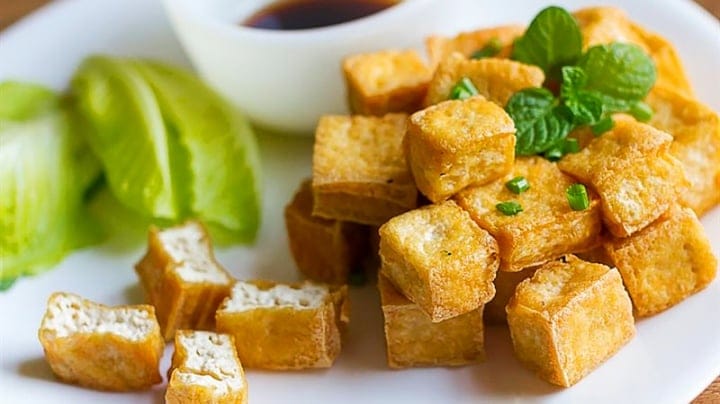
Be proactive, and don’t hesitate to inquire about modifications or substitutions to accommodate your preferences. Many chefs are receptive and willing to accommodate dietary restrictions, ensuring that you can savor delicious vegan meals even in non-vegan restaurants. With a bit of planning and effort, dining out as a vegan becomes an exciting and flavor-packed adventure.
Vietnam dim sum is also a must-try dish.
Conclusion
With all the great vegan options in Vietnam, there’s no reason not to explore the wonderful world of vegan delights while you’re on holiday. Not only can you experience some of the best local flavors, but you also can feel assured that you can dine as a vegan without compromising your beliefs.
Plus, don’t be shy about requesting food sans meat or fish, as there is no shortage of friendly restaurateurs keenly willing to make adaptations. Vietnam truly has something for everyone, and with its vibrant selection of vegan food, it’s become an attractive destination for many who have been looking for something new. Veggie lovers rejoice!


Related Posts
Saigon’s “Flower Market Replica”: Where To Find Them
Ho Chi Minh City’s floral charm is not limited to its bustling wholesale markets. Imagine wandering through a place where vibrant petals, fragrant blooms, and the spirit of traditional Vietnamese markets come alive—without the overwhelming crowds. A flower market replica captures that magic, blending the beauty of fresh flowers with the charm of a curated, […]
Is it Safe to Travel to Vietnam Right Now? A Complete 2025 Guide
Vietnam has emerged as one of Southeast Asia’s most captivating destinations, drawing millions of visitors annually with its rich culture, stunning landscapes, and incredible cuisine. However, many travelers still ask: Is it safe to travel to Vietnam right now? This comprehensive guide provides you with everything you need to know about Vietnam travel safety in […]
Ho Chi Minh Cu Chi Tunnels Tour: The Ultimate Guide
The Cu Chi Tunnels stand as one of Vietnam’s most remarkable historical sites, offering visitors a profound glimpse into the ingenuity and resilience displayed during the Vietnam War. For travelers, a Ho Chi Minh Cu Chi tunnels tour represents an essential experience that combines education, adventure, and deep cultural understanding. This comprehensive guide will help […]